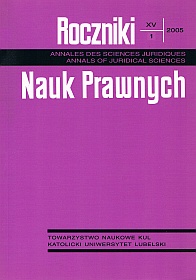The Basic Problems of the reformationis in peius Ban in Administrative Proceedings
Abstract
The administrative proceedings regulate the principles to proceed on the organs of administration that implement the imperial acts (imperium) in relation to their subordinates. In the administrative-legal relations one therefore cannot find autonomy or equal status of those relations characteristic of private-legal relations.
Such presumptions are reflected in the principles that govern the administrative proceedings, broadly understood, a fact that affects also the permissibility and interpretation of the reformationis in peius ban (the legal situation of the person who brings in a lawsuit against an organ of the lower rank), which is also regulated by this proceeding. This institution takes on a special importance in the context of the two-instance administrative judiciary that has been in effect in Poland.
The reformationis in peius ban in the administrative proceeding can be supported by the fact that this institution is one of the fundamental principles of the trial law in the democratic rule of law.
References
Adamiak B., Borkowski J.: Kodeks postępowania administracyjnego. Komentarz, wyd. 5, Warszawa 2003.
Borkowski J.: Ustawy o dwuinstancyjnym sądownictwie administracyjnym, cz. I, MoP 2003, nr 7, s. 297 n., cz. II − nr 8, s. 345 n.
Chróścielewski W.: Recenzja pracy A. Skóry, Reformatio in peius w postępowaniu administracyjnym, „Państwo i Prawo”, 2002, z. 12, s. 83 n.
Janowicz Z.: Kodeks postępowania administracyjnego. Komentarz, wyd. 4, Warszawa 1999.
Jaśkowska M., Wróbel A.: Kodeks postępowania administracyjnego. Komentarz, Kraków 2000.
Kmieciak Z.: Ochrona tymczasowa w postępowaniu sądowoadministracyjnym, „Państwo i Prawo”, 2003, z. 5, s. 18 n.
Kmieciak Z.: Postępowanie administracyjne w świetle standardów europejskich, Warszawa 1997.
Knysiak-Molak H.: Uprawnienia strony w postępowaniu administracyjnym, Kraków 2004.
Marszał K.: Zakaz „reformationis in peius” w nowym ustawodawstwie karnym, Warszawa 1970.
Mastalski R., Zubrzycki J.: Ordynacja podatkowa. Komentarz, wyd. 5, Wrocław 2002.
Michalski J.: Ordynacja podatkowa. Komentarz, Warszawa 2002.
Pogonowski P.: Zakaz „reformationis in peius” w postępowaniu cywilnym, Warszawa 2004.
Postępowanie sądowo-administracyjne, red. T. Woś, Warszawa 2004.
Skóra A.: „Reformatio in peius” w postępowaniu administracyjnym, Gdańsk 2002.
Skóra A.: Skutki naruszenia zakazu „reformationis in peius” w postępowaniu administracyjnym, „Państwo i Prawo”, 2002, z. 6, s. 67 n.
Tarno J. P.: Prawo o postępowaniu przed sądami administracyjnymi. Komentarz, Warszawa 2004.
Woś T.: Dwuinstancyjne sądownictwo administracyjne a konstytucyjne prawo do rozpoznania sprawy „bez nieuzasadnionej zwłoki”, „Państwo i Prawo”, 2003, z.8, s. 18 n.
Załęska-Świątkiewicz B.: Sądownictwo administracyjne, „Rejent”, 2004, nr 1, s. 75 n.
Zimmerman J.: Zakaz reformationis in peius wpostępowaniu administracyjnym i sądowo-administracyjnym, [w:] Księga Pamiątkowa poświęcona Prof. dr hab. E. Ochendowskiemu, Toruń 1999, s. 352 n.
Copyright (c) 2005 Roczniki Nauk Prawnych

This work is licensed under a Creative Commons Attribution-NonCommercial-NoDerivatives 4.0 International License.


